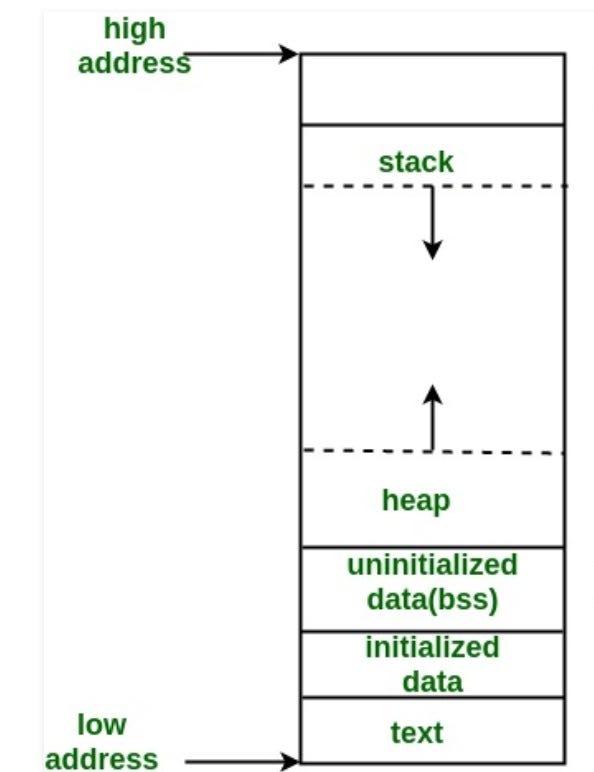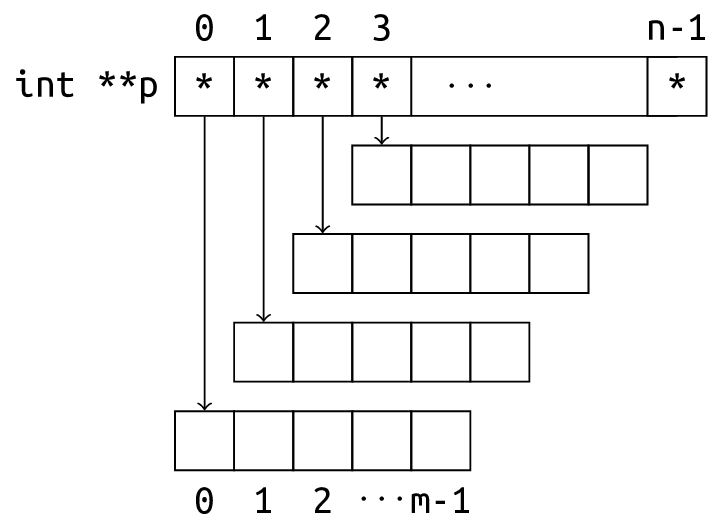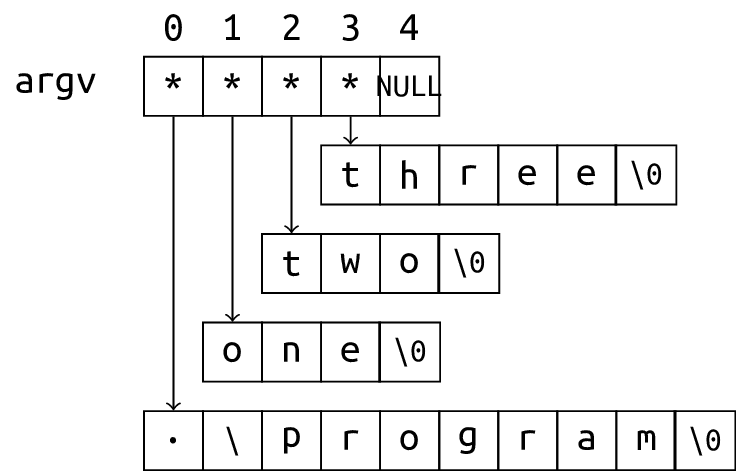CS100 Lecture 8
Dynamic Memory and Strings Revisited
Contents
- Recap
- Command line arguments
- Example: Read a string of unknown length
Recap
Stack memory vs heap (dynamic) memory
Use malloc
- Allocate memory for an
int? - Allocate memory for \(100\)
ints? - Allocate memory for a "2-d" array with \(n\) rows and \(m\) columns?
- Test allocation failure?
Use malloc
- Allocate memory for an
int?
c
int *p = malloc(sizeof(int));
*p = 42;
printf("%d\n", *p);
- Allocate memory for \(n\) ints?
c
int *p = malloc(sizeof(int) * n);
for (int i = 0; i < n; ++i)
scanf("%d", p + i); // What does `p + i` mean?
Use malloc
- Allocate memory for a "2-d" array with \(n\) rows and \(m\) columns?
int **p = malloc(sizeof(int *) * n);
for (int i = 0; i < n; ++i)
p[i] = malloc(sizeof(int) * m);
for (int i = 0; i < n; ++i)
for (int j = 0; j < m; ++j)
scanf("%d", &p[i][j]);
Use malloc
- Allocate memory for a "2-d" array with \(n\) rows and \(m\) columns?
Another way: Allocate a "1-d" array of \(nm\) elements:
c
int *p = malloc(sizeof(int) * n * m);
for (int i = 0; i < n; ++i)
for (int j = 0; j < m; ++j)
scanf("%d", &a[i * m + j]); // a[i * m + j] is the (i, j)-th entry
Use free
- What pointer should be passed to
free? - What does
free(NULL)do? - What if we forget to
free? - After a call to
free(ptr), what is the value ofptr? - What will happen if we
freean address twice?
Use free
-
What pointer should be passed to
free? -
The pointer must be either null or equal to a value returned earlier by an allocation function (one of
malloc,calloc,aligned_allocandrealloc). -
What does
free(NULL)do? -
Nothing.
-
What if we forget to
free? -
Memory leak.
Use free
-
After a call to
free(ptr), what is the value ofptr? -
ptrbecomes a dangling pointer, which cannot be dereferenced. -
What will happen if we
freean address twice? -
Undefined behavior (and is often severe runtime error).
Use malloc and free
Which of the following pieces of code deallocate(s) the memory correctly?
int *p = malloc(sizeof(int) * 100);
free(p);for (int i = 0; i < 100; ++i) free(p + i);free(p + 50); free(p);for (int i = 0; i < 10; ++i) free(p + i * 10);
Use malloc and free
Which of the following pieces of code deallocate(s) the memory correctly?
int *p = malloc(sizeof(int) * 100);
free(p);Yesfor (int i = 0; i < 100; ++i) free(p + i);Nofree(p + 50); free(p);Nofor (int i = 0; i < 10; ++i) free(p + i * 10);No
You cannot deallocate only a part of the memory block!
Strings
- What is a string in C?
- How can we obtain the length of a string?
- How do we read / write a string?
- How does a function accept and handle a string?
Strings
- What is a string in C?
- A sequence of characters stored contiguously, with
'\0'at the end. - How can we obtain the length of a string?
strlen(s)- How do we read / write a string?
scanf/printfwith"%s"fgets,puts
Strings
-
How does a function accept and handle a string?
-
The function accepts a
char *, indicating the start of the string. - The end of the string is found by searching for the first appearance of
'\0'. - What is the result of
printf(NULL)?
Strings
-
How does a function accept and handle a string?
-
The function accepts a
char *, indicating the start of the string. - The end of the string is found by searching for the first appearance of
'\0'. - What is the result of
printf(NULL)?- Undefined behavior!
printfexpects a string for the first argument, which should contain at least a character'\0'.
- Undefined behavior!
* Differentiate between the null character '\0', the empty string "" and the null pointer NULL.
Command line arguments
Command line arguments
The following command executes gcc.exe, and tells it the file to be compiled and the name of the output:
gcc hello.c -o hello
How are the arguments hello.c, -o and hello passed to gcc.exe?
- It is definitely different from "input".
A new signature of main
int main(int argc, char **argv) { /* body */ }
Run this program with some arguments: .\program one two three
int main(int argc, char **argv) {
for (int i = 0; i < argc; ++i)
puts(argv[i]);
}
Output:
.\program
one
two
three
A new signature of main
int main(int argc, char **argv) { /* body */ }
where
argcis a non-negative value representing the number of arguments passed to the program from the environment in which the program is run.argvis a pointer to the first element of an array ofargc + 1pointers, of which- the last one is null, and
- the previous ones (if any) point to strings that represent the arguments.
If argv[0] is not null (or equivalently, if argc > 0), it points to a string representing the program name.
Command line arguments
int main(int argc, char **argv) { /* body */ }
argv is an array of pointers that point to the strings representing the arguments:
Example: Read a string of unknown length
Read a string
fgets(str, count, stdin) reads a string, but at most count - 1 characters.
scanf("%s", str) reads a string, but not caring about whether the input content is too long to fit into the memory that str points to.
For example, the following code is likely to crash if the input is responsibility:
char word[6];
scanf("%s", word);
scanf does nothing to prevent the disaster.
- It does not even know how long the array
wordis!
Read a string of unknown length
Suppose we want to read a sequence of non-whitespace characters, the length of which is unknown.
- Use
malloc/freeto allocate and deallocate memory dynamically. - When the current buffer is not large enough, we allocate a larger one and copies the stored elements to it!
Ignore leading whitespaces:
char *read_string(void) {
char c = getchar();
while (isspace(c))
c = getchar();
}
Set a buffer with initial capacity.
char *read_string(void) {
char c = getchar();
while (isspace(c))
c = getchar();
char *buffer = malloc(INITIAL_SIZE);
int capacity = INITIAL_SIZE;
int cur_pos = 0; // The index at which we store the input character.
}
Write a loop to read and store characters.
char *read_string(void) {
// ignore leading whitespaces
char *buffer = malloc(INITIAL_SIZE);
int capacity = INITIAL_SIZE;
int cur_pos = 0; // The index at which we store the input character.
while (!isspace(c)) {
if (cur_pos == capacity - 1) { // `-1` is for '\0'.
}
buffer[cur_pos++] = c;
c = getchar();
}
}
When the buffer is full, allocate a new one twice as large.
char *read_string(void) {
// ...
while (!isspace(c)) {
if (cur_pos == capacity - 1) { // `-1` is for '\0'.
char *new_buffer = malloc(capacity * 2);
memcpy(new_buffer, buffer, cur_pos); // copy everything we have stored
// to the new buffer
capacity *= 2;
buffer = new_buffer;
}
buffer[cur_pos++] = c;
c = getchar();
}
}
* Are we done?
Do not forget to free!
char *read_string(void) {
// ...
while (!isspace(c)) {
if (cur_pos == capacity - 1) { // `-1` is for '\0'.
char *new_buffer = malloc(capacity * 2);
memcpy(new_buffer, buffer, cur_pos); // copy everything we have stored
// to the new buffer
free(buffer); // !!!!!!!!!!!
capacity *= 2;
buffer = new_buffer;
}
buffer[cur_pos++] = c;
c = getchar();
}
}
Don't consume more than what we need from the input.
char *read_string(void) {
// ...
while (!isspace(c)) {
if (cur_pos == capacity - 1) { // `-1` is for '\0'.
// ...
}
buffer[cur_pos++] = c;
c = getchar();
}
// Now, `c` is a whitespace. This is not part of the contents we need.
ungetc(c, stdin); // Put that whitespace back to the input.
return buffer;
}
* Are we done?
Don't forget the null character!
char *read_string(void) {
// ...
while (!isspace(c)) {
if (cur_pos == capacity - 1) { // `-1` is for '\0'.
// ...
}
buffer[cur_pos++] = c;
c = getchar();
}
// Now, `c` is a whitespace. This is not part of the contents we need.
ungetc(c, stdin); // Put that whitespace back to the input.
buffer[cur_pos] = '\0'; // Remember this!!!
return buffer;
}
Use
int main(void) {
char *content = read_string();
puts(content);
free(content);
}
Remember to free it after use!


